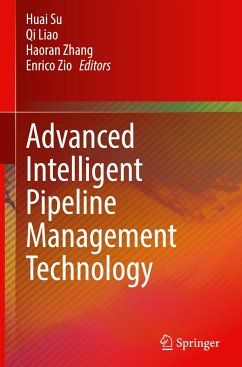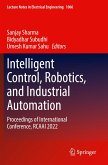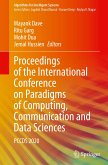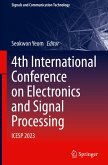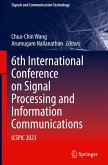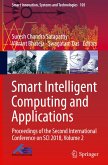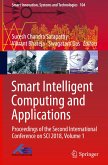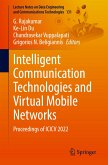Advanced Intelligent Pipeline Management Technology
Herausgegeben:Su, Huai; Liao, Qi; Zhang, Haoran; Zio, Enrico
Advanced Intelligent Pipeline Management Technology
Herausgegeben:Su, Huai; Liao, Qi; Zhang, Haoran; Zio, Enrico
- Gebundenes Buch
- Merkliste
- Auf die Merkliste
- Bewerten Bewerten
- Teilen
- Produkt teilen
- Produkterinnerung
- Produkterinnerung
This book summarizes the advanced intelligent pipeline management technologies. The text discusses the main challenges of how to define and reinvent data-driven intelligent pipeline systems by studying scheduling-operation- safety management systems. Additionally, within an all-around intelligent pipeline system technology development framework, this book characterizes the scientific problems of intelligent pipeline system services among different processes, such as scheduling, demand-side management, operation condition monitoring, safety analysis, fault detection, etc. This book also…mehr
Andere Kunden interessierten sich auch für
![Intelligent Control, Robotics, and Industrial Automation Intelligent Control, Robotics, and Industrial Automation]() Intelligent Control, Robotics, and Industrial Automation209,99 €
Intelligent Control, Robotics, and Industrial Automation209,99 €![Proceedings of the International Conference on Paradigms of Computing, Communication and Data Sciences Proceedings of the International Conference on Paradigms of Computing, Communication and Data Sciences]() Proceedings of the International Conference on Paradigms of Computing, Communication and Data Sciences150,99 €
Proceedings of the International Conference on Paradigms of Computing, Communication and Data Sciences150,99 €![4th International Conference on Electronics and Signal Processing 4th International Conference on Electronics and Signal Processing]() 4th International Conference on Electronics and Signal Processing149,99 €
4th International Conference on Electronics and Signal Processing149,99 €![6th International Conference on Signal Processing and Information Communications 6th International Conference on Signal Processing and Information Communications]() 6th International Conference on Signal Processing and Information Communications164,99 €
6th International Conference on Signal Processing and Information Communications164,99 €![Smart Intelligent Computing and Applications Smart Intelligent Computing and Applications]() Smart Intelligent Computing and Applications150,99 €
Smart Intelligent Computing and Applications150,99 €![Smart Intelligent Computing and Applications Smart Intelligent Computing and Applications]() Smart Intelligent Computing and Applications150,99 €
Smart Intelligent Computing and Applications150,99 €![Intelligent Communication Technologies and Virtual Mobile Networks Intelligent Communication Technologies and Virtual Mobile Networks]() Intelligent Communication Technologies and Virtual Mobile Networks186,99 €
Intelligent Communication Technologies and Virtual Mobile Networks186,99 €-
-
-
This book summarizes the advanced intelligent pipeline management technologies. The text discusses the main challenges of how to define and reinvent data-driven intelligent pipeline systems by studying scheduling-operation- safety management systems. Additionally, within an all-around intelligent pipeline system technology development framework, this book characterizes the scientific problems of intelligent pipeline system services among different processes, such as scheduling, demand-side management, operation condition monitoring, safety analysis, fault detection, etc. This book also introduces the existing positive and successful intelligent pipeline system projects that can be identified in the studied domain, and how can they be best applied for practical success. The text is supported by informative illustrations and case studies so that practitioners can use the book as a toolbox to improve understanding in applying the novel technologies into intelligent pipeline systemmanagement and development.
Produktdetails
- Produktdetails
- Verlag: Springer / Springer Nature Singapore / Springer, Berlin
- Artikelnr. des Verlages: 978-981-19-9898-0
- 1st ed. 2023
- Seitenzahl: 208
- Erscheinungstermin: 13. Dezember 2023
- Englisch
- Abmessung: 241mm x 160mm x 17mm
- Gewicht: 521g
- ISBN-13: 9789811998980
- ISBN-10: 9811998981
- Artikelnr.: 66994890
- Herstellerkennzeichnung
- Springer-Verlag GmbH
- Tiergartenstr. 17
- 69121 Heidelberg
- ProductSafety@springernature.com
- Verlag: Springer / Springer Nature Singapore / Springer, Berlin
- Artikelnr. des Verlages: 978-981-19-9898-0
- 1st ed. 2023
- Seitenzahl: 208
- Erscheinungstermin: 13. Dezember 2023
- Englisch
- Abmessung: 241mm x 160mm x 17mm
- Gewicht: 521g
- ISBN-13: 9789811998980
- ISBN-10: 9811998981
- Artikelnr.: 66994890
- Herstellerkennzeichnung
- Springer-Verlag GmbH
- Tiergartenstr. 17
- 69121 Heidelberg
- ProductSafety@springernature.com
Dr. Haoran Zhang is a researcher at the School of Urban Planning and Design, Peking University. His research includes urban data mining, smart supply chain, and urban energy system. He is the author of numerous journal articles and Editorial Board Member of several international academic journals, such as Advances in Applied Energy and Engineering Reports. He has PhDs in both Engineering and Sociocultural Environment and was awarded Excellent Young Researcher by Japan's Ministry of Education, Culture, Sports, Science and Technology. Dr. Su Huai is Associated Professor of China University of Petroleum, Beijing. He is also Visiting Researcher at the Politecnico di Milano, Italy. He is serving as Associate Editor of Petroleum Science. He focuses on reliability analysis and optimization of oil and gas pipeline systems. His research interests include analysis of the reliability, safety, and security of complex pipeline systems; soft computing techniques for safety and reliability applications, oil & gas system fault diagnosis, and optimal design. His research of intelligent technology in oil & gas pipelines was awarded the first prize of Science and Technology Awards by China Petroleum and Chemical Industry Federation. Dr. Liao Qi is a Post doctor of College of Mechanical and Transportation Engineering in The University of Petroleum-Beijing, China. Her major research interest focuses on the optimization of oil & gas supply chain, and has developed software in the field of pipeline simulation and scheduling optimization, which have been successfully applied to a number of oil products pipelines in China, providing reliable technical support for the production and operation of domestic pipelines. Another contribution is to introduce the data mining technology into the optimization of pipeline operation. By processing and analyzing the historical scheduling data, the scheduling knowledge and rules under different operation scenarios are mined to quickly generate good initials solution for the large-scale model, improving the computation time by over 90%. Her current research interest is the operation management of China's oilfield and multi-product pipeline network under carbon-neutral target, including life cycle assessment, economic-environmental analysis, and integrated technology of oil & gas pipeline network and clean energy transmission network. So far, she has issued more than 50 refereed international journal papers, with 16 ones as first/corresponding author. She has also received two provincial and ministerial levels Natural Science and Science & Technology Progress Awards with 1 first prizes and 1 second prizes. Dr. Enrico Zio received the MSc degree in nuclear engineering from Politecnico di Milano in 1991 and in mechanical engineering from UCLA in 1995, and the Ph.D. degree in nuclear engineering from Politecnico di Milano and in probabilistic risk assessment at MIT in 1996 and 1998, respectively. He is currently full professor at the Centre for research on Risk and Crises (CRC) of Ecole de Mines, ParisTech, PSL University, France, full professor and President of the Alumni Association at Politecnico di Milano, Italy, distinguished guest professor at Tsinghua University, Beijing, China, adjunct professor at City University of Hong Kong, Beihang University and Wuhan University, China and Co-Director of the Center for REliability and Safety of Critical Infrastructures (CRESCI) and the sino-french laboratory of Risk Science and Engineering (RISE), at Beihang University, Beijing, China. He is IEEE and Sigma Xi Distinguished Lecturer. In 2020, he has been awarded the prestigious Humboldt Research Award from the Alexander von Humboldt Foundation in Germany, one the world's most prestigious research awards across all scientific disciplines. The Award is given to outstandingly qualified researchers and future leaders from science-related fields (but very seldom awarded to engineers!). The Award isgranted in recognition of a researcher's entire achievements to date, to academics whose fundamental discoveries, new theories, or insights have had a significant impact on their own discipline and who are expected to continue producing cutting-edge achievements in the future. Professor Zio has been selected for the Award in light of being a World leading scientist in Risk and Resilience Assessment, Safety Analysis and Reliability Engineering of complex systems and infrastructures, in particular for energy applications. His H-index is 72. He has been one of the pioneers in using artificial intelligence (such as neural networks) and genetic algorithms in reliability engineering and risk assessment, solving key problems related to the safety and reliability of critical systems such as those used in the nuclear, oil and gas, transportation industries. He has promoted the use of computational modeling within various international initiatives. In 2021, he has been appointed as: · Member of the Board Committee of the International Joint Research Center for Resilient Infrastructure (ICRI) 2021-2026 · 4TU.Resilience Ambassador by the 4TU Centre for Resilience Engineering and its backbone - the 4TU-programme DeSIRE (Designing Systems for informed Resilience Engineering), a strategic capacity building research programme of the four Dutch Technical Universities · Fellow of the of the Prognostics & Health Management Society a world recognized scientist in the area of reliability centered, condition based and predictive maintenance. His research focuses on the modeling of the failure-repair-maintenance behavior of components and complex systems, for the analysis of their reliability, maintainability, prognostics, safety, vulnerability, resilience and security characteristics, and on the development and use of Monte Carlo simulation methods, artificial intelligence techniques and optimization heuristics. He is author and co-author of seven books and more than 500 papers on international journals, Chairman and Co-Chairman of several international Conferences, associate editor of several international journals and referee of more than 20.
Chapter 1 - Overview for pipeline scheduling.- Chapter 2 - Advanced Modelling and algorithm for pipeline scheduling.- Chapter 3 - Demand Side Management in smart pipeline networks.- Chapter 4 - Operation condition monitoring for pipeline.- Chapter 5 - Operation condition prediction for pipeline.- Chapter 6 - Intelligent inspection for pipeline system.- Chapter 7 - Probabilistic Safety Analysis in complex pipeline systems.- Chapter 8 - Risk pre-warning method for pipeline systems.- Chapter 9 - Fault detection and diagnose method for pressurization devices.- Chapter 10 - Intelligent leakage detection for pipelines.- Chapter 11 - Smart emergency management of pipeline system.- Chapter 12 - Simulation of natural gas pipeline system.
Chapter 1 - Overview for pipeline scheduling.- Chapter 2 - Advanced Modelling and algorithm for pipeline scheduling.- Chapter 3 - Demand Side Management in smart pipeline networks.- Chapter 4 - Operation condition monitoring for pipeline.- Chapter 5 - Operation condition prediction for pipeline.- Chapter 6 - Intelligent inspection for pipeline system.- Chapter 7 - Probabilistic Safety Analysis in complex pipeline systems.- Chapter 8 - Risk pre-warning method for pipeline systems.- Chapter 9 - Fault detection and diagnose method for pressurization devices.- Chapter 10 - Intelligent leakage detection for pipelines.- Chapter 11 - Smart emergency management of pipeline system.- Chapter 12 - Simulation of natural gas pipeline system.

